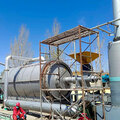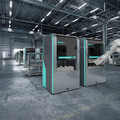In the quest for sustainable and eco-friendly solutions, the emergence of charcoal maker machines stands out as a bioenergy breakthrough. These innovative machines are transforming biomass into valuable charcoal, offering a cleaner alternative to traditional charcoal production methods. In this article, we explore the significance of charcoal maker machines in ushering in a greener world and the positive impact they can have on both the environment and energy landscape.

The Evolution of Charcoal Production:
Charcoal has been a significant source of energy for centuries, used for cooking, heating, and various industrial processes. Traditional methods of charcoal production, however, often involve deforestation and inefficient, polluting practices. The advent of charcoal maker machine represents a pivotal shift in the way we produce and utilize this essential energy source.
The Charcoal Maker Machine Process:
At the heart of the bioenergy breakthrough lies the advanced process employed by charcoal maker machines. These machines utilize a controlled pyrolysis process, which involves heating biomass, such as wood chips, agricultural residues, or coconut shells, in the absence of oxygen. This thermal decomposition results in the production of charcoal, bio-oil, and combustible gases.
Unlike traditional methods that release harmful pollutants into the atmosphere, the controlled environment of charcoal maker machines ensures that the process is not only efficient but also environmentally friendly. The absence of oxygen in the pyrolysis chamber prevents the formation of harmful by-products, contributing to cleaner air quality and a reduced carbon footprint.
Environmental Benefits of Charcoal Maker Machines:
Deforestation Mitigation: Traditional charcoal production often involves the indiscriminate cutting down of trees, leading to deforestation and loss of biodiversity. Charcoal maker machines, by utilizing various types of biomass, help mitigate the demand for wood-based charcoal, thereby preserving forests and ecosystems.
Reduced Greenhouse Gas Emissions: The controlled pyrolysis process in charcoal maker machines minimizes the release of greenhouse gases compared to traditional methods. The efficient conversion of biomass into charcoal reduces carbon dioxide emissions, contributing to climate change mitigation efforts.
Waste Utilization: Charcoal maker machines can process a diverse range of biomass, including agricultural residues and organic waste. By converting these materials into valuable charcoal, these machines contribute to waste reduction and provide an eco-friendly solution for agricultural by-products.
Biochar for Soil Improvement: The by-product of the pyrolysis process, known as biochar, is a stable form of carbon that can be used to enhance soil fertility. Adding biochar to soil improves water retention, nutrient availability, and overall soil structure, promoting sustainable agriculture practices.
Sustainable Energy Production:
One of the key contributions of charcoal maker machines to a greener world is their role in sustainable energy production. The charcoal produced can be used as a clean and efficient fuel for cooking and heating. The bio-oil and combustible gases generated during the process can also be harnessed as renewable energy sources, reducing dependence on non-renewable fossil fuels.
Community and Economic Impact:
The adoption of charcoal maker machines goes beyond environmental benefits; it also has positive implications for local communities and economies. Here's how:
Job Creation: Establishing and operating charcoal maker machines can create employment opportunities in local communities. From machine operators to maintenance personnel, the deployment of this technology contributes to job creation and skill development.
Local Entrepreneurship: Charcoal maker machines provide an avenue for local entrepreneurs to engage in sustainable business ventures. Small-scale enterprises can invest in these machines, processing locally available biomass and contributing to both energy production and economic development.
Reduced Health Risks: Traditional charcoal production methods, such as open-air kilns, expose workers to harmful pollutants. Charcoal maker machines, by virtue of their enclosed and controlled processes, reduce health risks associated with inhaling toxic fumes, making the working environment safer for individuals involved in charcoal production.
Challenges and Considerations:
While the potential of charcoal maker machines is immense, it's essential to address challenges associated with their adoption:
Initial Investment: The capital required to acquire and set up charcoal maker machines can be a barrier, particularly for small businesses and communities. Governments and organizations can play a role in providing financial support or incentives to promote widespread adoption.
Quality Control: The variability in biomass feedstocks introduces challenges in maintaining consistent charcoal quality. Implementing stringent quality control measures is crucial to ensure that the produced charcoal meets industry standards and user expectations.
Awareness and Education: Public awareness about the benefits of charcoal maker machines and the importance of sustainable charcoal production is essential. Educational initiatives can help dispel myths and misconceptions, fostering a greater understanding of the technology's positive impact.

Government Support and Policy Initiatives:
For charcoal maker machines to reach their full potential, supportive government policies and initiatives are instrumental. This can include:
Financial Incentives: Governments can provide financial incentives, such as subsidies or tax breaks, to encourage businesses and communities to invest in charcoal maker machines.
Regulatory Frameworks: Establishing clear regulatory frameworks ensures that the operation of charcoal maker machines adheres to environmental and safety standards, promoting responsible and sustainable practices.
Capacity Building: Government-supported training programs can enhance the skills of individuals involved in operating and maintaining charcoal maker machines, fostering a skilled workforce.
The Future of Bioenergy:
Charcoal maker machines represent a crucial component of the broader bioenergy landscape. As the world seeks cleaner and more sustainable energy alternatives, the role of these machines in biomass conversion becomes increasingly significant. The bioenergy breakthrough they embody aligns with global efforts to transition towards a low-carbon economy and mitigate the impacts of climate change.
In conclusion, charcoal maker machines are not merely technological innovations; they represent a paradigm shift in how we approach energy production and environmental stewardship. By harnessing the potential of biomass to produce clean energy and valuable by-products, these machines offer a pathway to a greener, more sustainable world. As awareness grows, and as support from governments and communities increases, the widespread adoption of charcoal maker machines holds the promise of a cleaner, healthier, and more resilient future.





